Tourism as a Force for Good in Colombia
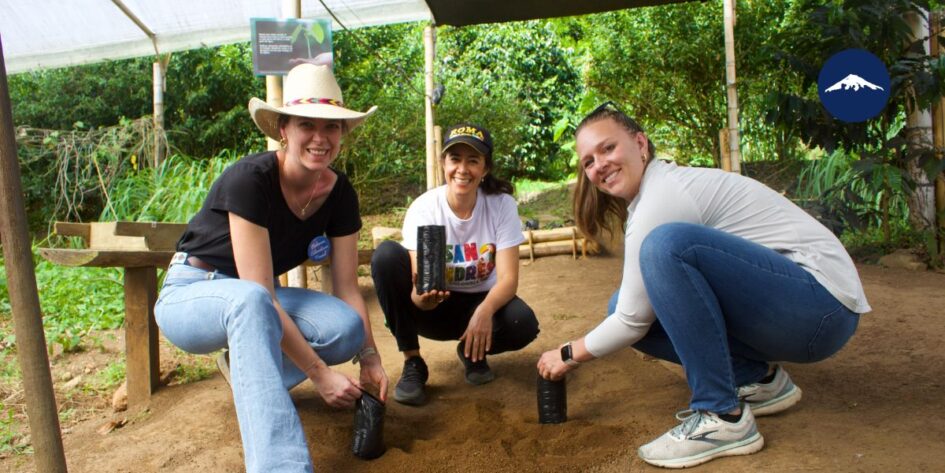
Wondering about tourism in Colombia? Colombia‘s transformation into a beacon for responsible tourism highlights its journey from years of conflict to a hub of innovative travel projects. This evolution has not only reshaped the country’s image but also spotlighted the indomitable spirit of its people. With their forward-looking “Pa’delante!” (onwards) attitude, Colombians have spearheaded remarkable initiatives benefiting displaced migrants, known as desplazados, who seek refuge from conflict. These travel ventures, often led by social leaders and formidable women known as Berracas, exemplify the hardworking nature of Colombians.
Tourism in Colombia: Spotlight on Social Leaders
Oscar’s Community Transformation Through Art
Each community has a social leader, who functions as the unofficial head of the community. They give the vulnerable a voice so their stories can be told. On our recent trip to Colombia, we visited Manrique, an impoverished neighborhood in Medellín. There, we met Oscar, who developed a graffiti route with over 500 painted houses to tell the story about Manrique‘s residents, called Constelaciones.
The neighborhood used to be Padre Fernando Velez’s estate Hacienda Brisa de Oriente. Mr. Velez split up the land between the residents so each family could have their own house and build a home. We had the best time interacting with locals and learning about their history. They let us taste some Bocadillo (Guayaba sweets) and Masa Amora (corn drink). Through these tours, Oscar generates work for 12 families, which improves living circumstances for 145,000 habitants.
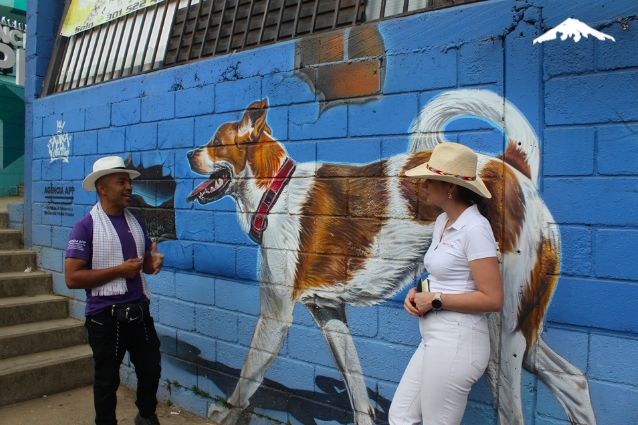
Oscar shows Rebecca some transformational art in Comuna Manrique.
Melisa’s Putamente Poderosas Advocacy
In Colombia, prostitution is not illegal; however, it is not well regulated. Therefore these women’s rights are not respected and almost non-existent. On our trip, we met Melisa, the founder of Putamente Poderosas, who decided to do something for this forgotten part of the community. As a theatermaker, she developed a theater show so eight sex workers from Medellín could tell their stories. As Melissa spent more time with them, she discovered that women who earn their living through sex work face numerous challenges. Since no regulations or labor laws protect their rights, these women are left on their own. This means they get no healthcare, bank accounts, schooling, or housing.
During COVID-19, Putamente Poderosas was the first organization to set up housing, food, and other basic needs for these 8,000 women and their kids. Since 2020, Melisa has given these women a voice, talking to Medellín’s municipality, and finding solutions like permanent housing, mental health services, schooling, and an emergency number for women in life-threatening situations. There are different ways travelers can support the foundation. You can do handicraft workshops with sex workers, and symbolically “adopt” kids to pay for their schooling. Another option is to donate a certain number of sessions with a psychologist to get women back on their feet after suffering traumatic experiences.
Leticia’s Commitment to Organic Farming
In Envigado, we met two very inspiring ladies, Martita and Leticia, who promote organic farming, advancing permaculture and healthy produce. Leticia owns a coffee farm, El Cafetal, where botanical goods are used instead of pesticides to keep plants healthy and happy. She showed us some of the processes, such as burning tobacco plants, creating oils from citronella and nettle, and smelling rosemary.
El Cafetal is the only small coffee farm in the area with the Rainforest Alliance certificate. This work is hard; it takes weeks to harvest and the price for coffee is very low. You can help Leticia by volunteering at her place, visiting her farm whenever you are in Medellín, buying pesticide-free coffee in your country, and being mindful about what you consume.
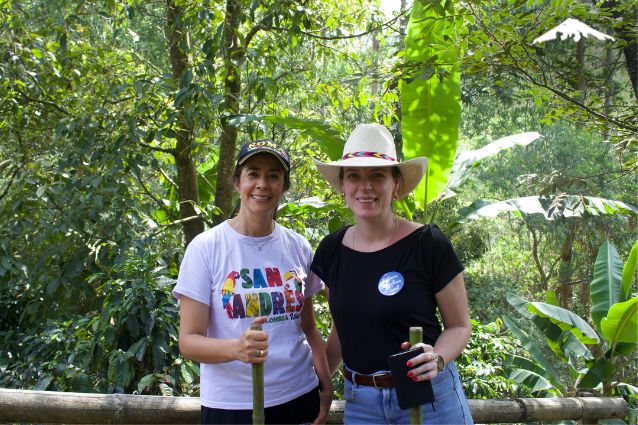
Rebecca with Leticia at her coffee farm.
Martita’s Holistic Wellness Mission
Martita is an inspiring female entrepreneur who used to own a printing business but due to the problems in Venezuela, she went bankrupt and had to start over again. Her (now deceased) husband gave her an old barn and with only recycled material she created a little paradise. In this countryside cottage, she teaches arts, gives cooking classes for holistic food and she is the most knowledgeable person I know in terms of medicinal plants.
You can also do cacao ceremonies with her and she can teach about the ancient medicinal usage of plants. One of her favorite crops is the vanilla plant. This plant is becoming a substitute for the coca plantations and she helps farmers who would like to change crops. She told us stories about how she lost her brothers, mother, and husband to cancer and she is very motivated to share her knowledge on healthy food since she believes healthy eating is key to a healthy life.
Nature Conservation at Hotel Las Islas in Baru Island
One of the hotels we visited in Las Islas was founded by Jean Claude Bessudo in 2017. Together with his family, he created a piece of paradise in the Caribbean Sea. Las Islas is actively conserving mangroves, recognizing their vital ecological significance. They have reforestation initiatives that protect biodiversity in the region. At the lodge, guests can explore by bicycle and enjoy the mesmerizing sight of plankton glowing at night.
Contributing to Tourism in Colombia
So, how can you be part of the responsible travel cycle? First of all is knowing the difference between being a tourist and a traveler. The distinction lies in your purpose and the impact you leave while exploring new places. Tourists often seek relaxation and entertainment, focusing on popular attractions. Their interaction with local culture tends to be more superficial, and limited to commercialized experiences. On the other hand, travelers aim for a deeper understanding and immersive experiences, along with off-the-beaten-path explorations and authentic engagements with locals. Travelers seek to positively impact the communities they visit by engaging more deeply with their culture.
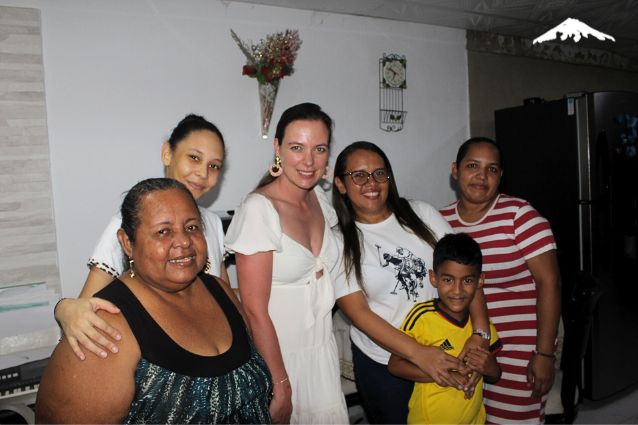
As a traveler, Rebecca enjoyed dinner with a local family in Cartagena.
It is key to have this in mind when visiting Colombia. The country offers various tourism options, including the controversial Narco Tourism. The Narco history with Pablo Escobar has been very appealing to tourists (not travelers anymore) which increased with the Netflix series, showing this as the only side of Colombia. Guides, hosts, and other locals who work with us all emphasize that it is not respectful to the Colombian people to do this type of tour that portrays criminals as heroes because every person in Colombia is a victim of Narco History in one way or another.
Tourism in Colombia Is Making the Country Safer
Colombia is a wonderful country, full of life, color, and friendly people. Like you would in every place, you must respect the culture and society, and behave responsibly. If you go to Colombia for Sex or Narco Tourism, it might be dangerous. There are cases where tourists want to go to Colombia with this intention, and yes that is dangerous and can lead to serious consequences. When booking accommodation in Colombia, make sure to check if they have an ESNA Certificate, which indicates they help fight against prostitution and human trafficking.
Colombia is in ongoing recovery from the conflict. Social leaders are a key part of overcoming, making them usual targets. As responsible travelers, we must contribute to their fight by traveling responsibly, contributing to the communities, and not supporting these negative industries.
Tour Colombia with your family
Is Colombia Dangerous?
We often get asked about safety while traveling, and it’s a great question. The truth is that Colombia is a vibrant and welcoming place when you approach it with respect, for its culture and society, and when you travel responsibly. At Rebecca Adventure Travel, we believe that tourism can be a force for good and can facilitate a sustainable transition. We meet so many inspiring people who would love to show you how they transformed a complicated history into a flourishing future. Other inspirational people that we met are:
- Nina, a German lady who transformed a complete neighborhood close to Cartagena (La Boquilla) with successful sustainable, cultural, and artisanal projects.
- Rosario, a 23-year-old from Medellín created a horse ranch, Equus, together with her father to teach about respect, do horse therapy, give female grooms a chance, and empower local horse culture.
- Berracas de la 13, a restaurant in Comuna 13 where Paola, as a (surrogate) mom to lots of kids that lost their families during the Narco time, created a safe environment and taught them to cook the most delicious dishes. Now you can take cooking classes here!
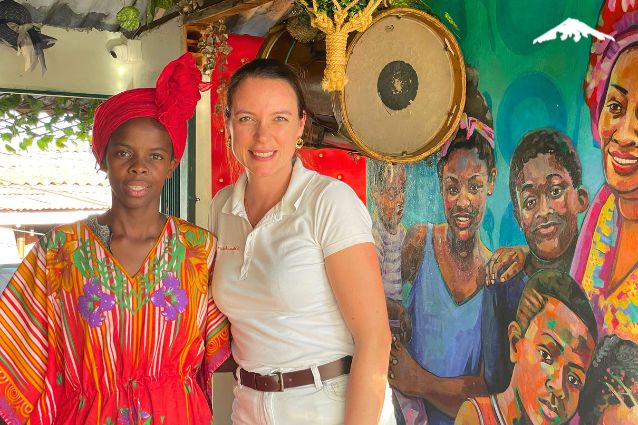
Rebecca with a Berraca lady from Comuna 13 in Medellín.
How To Travel to Colombia?
When you travel, embrace the beauty of making a positive difference! Imagine visiting a country and leaving it even more vibrant than you found it: that’s the heart of Regenerative Travel. By leaving a positive impact, supporting local foundations, engaging with community projects, and diving into intercultural learning, you’re not just a visitor; you become a part of something bigger. And let’s not forget the importance of respect. Colombia has so much to offer in terms of biodiversity and culture; there are lots of hidden treasures waiting to be discovered, in a respectful manner, by travelers who are willing to get to know the real Colombia.
You might also like:
- Colombian Coffee Region: What To Do With Kids
- Discover The Amazon Across Colombia, Ecuador & Perú
- 8 Ways to Make Your Travel More Sustainable in South America




